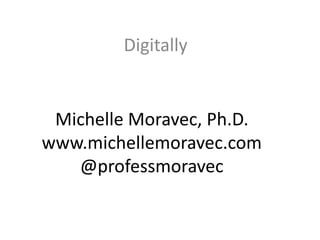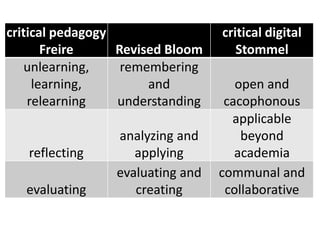Plain text
- 2. Inspiration NITLE Lisa Spiro Katherine D. Harris Kathryn Tomasek and Rebecca Frost Davis Rebecca Frost Davis Hybrid Pedagogy Jesse Stommel Adeline Koh
- 3. Barriers (Rebecca Frost Davis) ? Isolation ? Structures ? Learning cultures ? Changing faculty roles and retraining
- 4. Inspiration (Adeline Koh) ? You are already a digital humanist, whether or not you know it.
- 6. IMLS Davidson Jenkins critical pedagogy Revised Bloom critical thinking and problem solving attention, critical consumption of information, learning, unlearning, and relearning, assessment judgment; multi- tasking; distributed cognition unlearning, learning, relearning remembering and understanding innovation and creativity design, procedural literacy storytelling performance; play; simulation; appropriation reflecting analyzing and applying communication and collaboration collaboration, participation, network awareness, global consciousness, digitial divides ethics collective intelligence; transmedia navigation; networking; negotiation Evaluating evaluating and creating From Lisa Spiro
- 7. ? Centers its practice on community and collaborations ? Must remain open to diverse, international voices, and thus requires invention to reimagine the ways that communication and collaboration happen across cultural and political boundaries ? Will no, cannot be defined by a single voice but must gather together a cacophony of voices ? Must have use and application outside traditional institutions of education Critical Digital Pedagogy Jesse Stommel
- 8. critical pedagogy Freire Revised Bloom critical digital Stommel unlearning, learning, relearning remembering and understanding open and cacophonous reflecting analyzing and applying applicable beyond academia evaluating evaluating and creating communal and collaborative
- 9. Process Checklist for Integrating Digital Humanities Projects into Courses Tomasek and Davis ? Link here
- 10. Advice for digital (Katherine D Harris) LINK HERE
- 11. 5 Tips for a Successful Digital Project Moravec 2014 ? Work with at least one other person ? Leverage familiar platforms ? Set concrete and specific parameters ? Turn as much control as possible over to students ? Let the project evolve as you got
- 12. ? Think techne not just tools Pinterest boards ? digital pedagogy - inspirations, how to, how come ? Digital Pedagogy - assignments ? Digitally - How To












